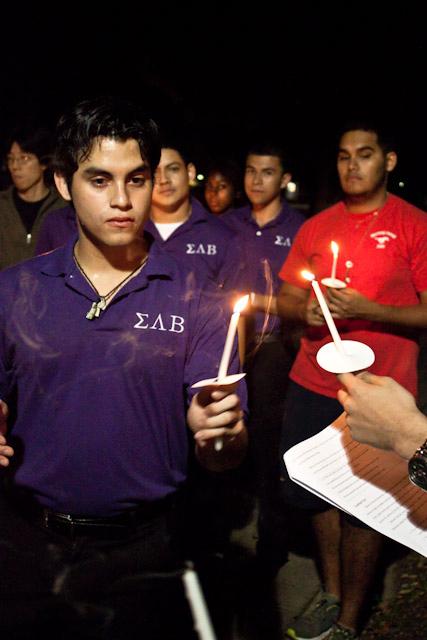
Oscar Cetina holds a candle in honor of “Take Back the Night” on Nov. 14. The annual event is hosted by the Women’s Center. (Kathleen Strauss/The Daily Campus)
Members of the Southern Methodist University community gathered for SMU’s annual Take Back the Night event on Monday in the Hughes-Trigg Student Center.
According to the Take Back the Night Foundation’s Facebook page, the event “seeks to end sexual violence in all of its forms including sexual assault, sexual abuse, dating violence and domestic violence.”
The evening began with a march around the Boulevard that included chants like “One, two, three, four, we won’t take it anymore. Five, six, seven, eight, No more violence, no more hate” and “We have the power, we have the right, the streets are ours, take back the night.”
The march was followed by a candlelight ceremony on the Clements Hall lawn.
During the ceremony, the leaders first asked participants to blow out their candles if they had any friends who were victims of sexual violence, and all but a few blew their candles out.
The leaders then asked the crowd if they had a relative who had been a victim, an immediate family member who had been a victim and if they had been a victim of sexual violence.
Each time fewer candles were blown out.
The final segment of the event was the “Speak Out,” which occurred back in the Hughes-Trigg Varsity.
Back in the Varsity, event co-chairs Melissa Maguire and Sammy Partida invited members of the audience to share how their lives had been impacted by sexual violence. Audience members shared how they and/or those close to them had been impacted.
One speaker shared that she was a domestic violence survivor, a sexual violence survivor and the mother of a rape survivor who will be graduating from SMU next month.
Another speaker, who identified himself as an SMU graduate student, spoke about how he learned as a teenager that he had been the result of his mother being raped at age 16 by a married 26-year-old she knew.
He said that while he was the first in his family to graduate high school, he also was afraid to date in high school because he was afraid of doing to someone what his biological father had done to his mother.
A women’s studies major, who identified herself simply as “Becca,” also spoke, saying, “It is not trivializing to think or it is not weak to feel that you can count yourself among them because we are all them in some way. We all know someone. We all are someone.”
The Speak Out portion wrapped up with Maguire and Partida sharing their own stories of how they had each been a victim of sexual violence. Speakers from the SMU Women’s Center, the Counseling and Psychiatric Services (CAPS) at SMU’s Memorial Health Center and the Dallas Area Rape Crisis Center (DARCC) followed. Students were encouraged to contact one of those organizations if they have been a victim of sexual violence, whether it was 20 minutes ago or 20 years ago.
“Racists and sexist remarks — you hear it sometimes, and you don’t say much because you think that person is not serious, they know better. But to see that things like that really affect people, especially if that sexist remark or racist comment was said to somebody who has been victim of any kind of prejudice,” Juan Castillo, a junior majoring in fine art and one of several Sigma Lambda Beta brothers in attendance, said. “It is really important, and I do feel better for having come out here.”
Val Erwin, SMU Women’s Center program advisor, is passionate about the cause.
“I thought this year it was very powerful,” she said. “A lot of different people shared their stories about sexual assault.”
Erwin also mentioned that the Women’s Center would be producing “The Vagina Monologues” in February 2012 to raise money for the Dallas Area Rape Crisis Center.
“It is really inspiring to see people come out, to see so many people share their stories,” co-chair Maguire, a sophomore majoring in Spanish and English, said. “It is often difficult, but I think through tonight, people found empowerment.”
If you or someone you know has been a victim of sexual violence, contact the SMU Women’s Center, SMU CAPS or the SMU Police.








